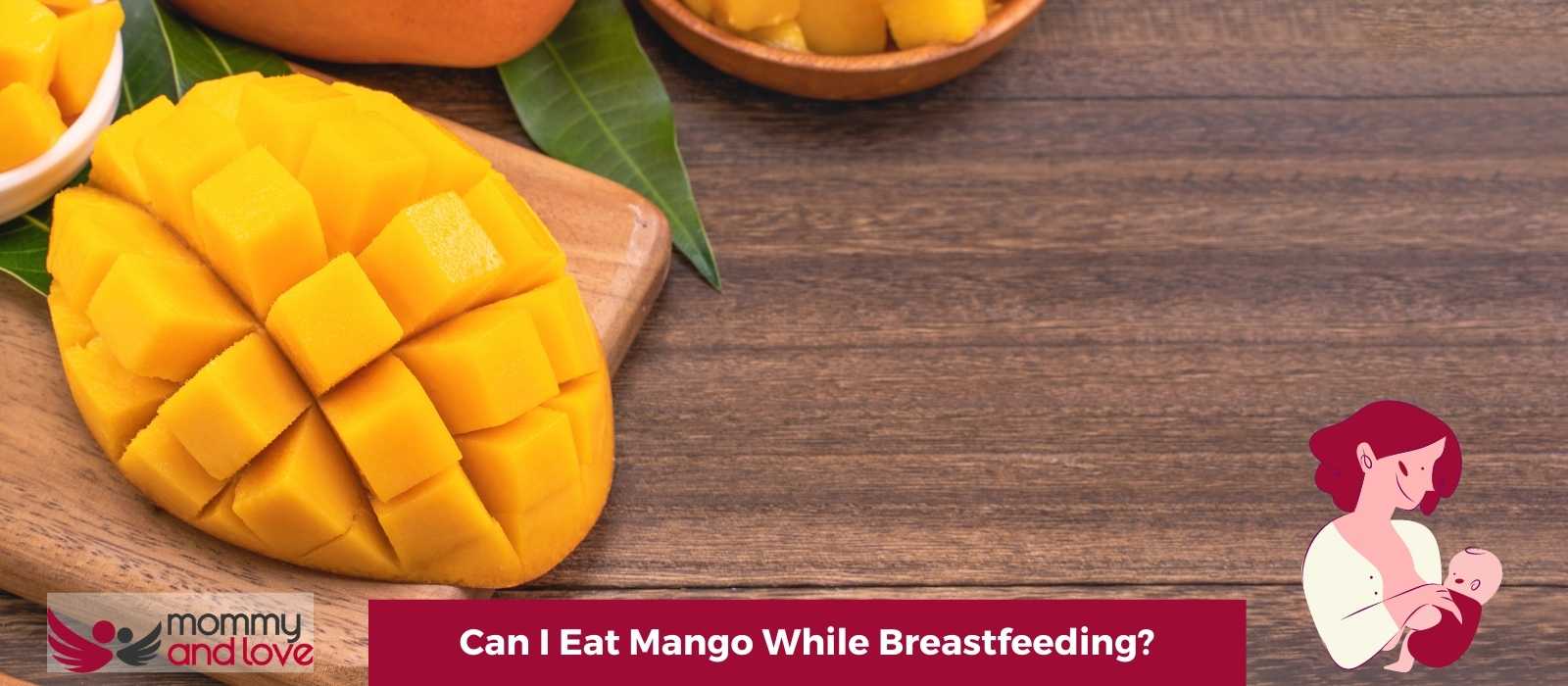Mangoes are a great source of essential nutrients and vitamin C, so you may be wondering: Can I eat mango while breastfeeding?
A breastfeeding mum’s recommended daily intake of Vitamin C is about 100 grams.
Similar to potassium-packed bananas, this fruit’s potassium content can help nursing mums maintain optimal fluid and electrolyte levels. All of these things are important for a breastfeeding mother and her baby.
Mangoes can help improve milk production for your baby, increase energy levels, and promote better digestion. They are also a good source of fiber, which can help prevent constipation and allow a breastfeeding mum replenish her nutrients and essential vitamins. They also have amazing antioxidant properties which help fight free radicals.
If you’d like to learn more, read our helpful blog post about super foods you should eat after giving birth.
Does Eating Mangoes Increase Breast Milk Supply?
A ripe mango is a delicious, sweet fruit that is often eaten as a snack or used in desserts. Mangoes are also rich in vitamins and minerals, making them an excellent choice for nursing moms.
Some nursing mothers believe that eating mango can help increase their breastmilk supply. While there is no scientific evidence to support this claim, it is believed that the vitamins and minerals found in mangoes can help boost breastmilk supply, they do not stop mother milk production.
If you are a nursing mother looking to increase your breast milk supply, eating ripe mangoes is a safe and delicious way to do so. Be sure to eat foods and fruits that are just as healthy and nutritious as mangoes and add them to your diet. And of course, it is extremely important to stay well hydrated to have a good supply of milk for your baby.
You can always talk to a lactation specialist or healthcare professional to help you with your parenting journey.
How to Add Mango to Your Breastfeeding Diet

Mangoes are not only delicious, but they’re also nutritious and can be a great addition to your diet while breastfeeding. Here are a few tips on how to add mango to your breastfeeding diet:
- Eat mangoes that are ripe as they are easier to digest.
- Add mangoes to smoothies or yogurt for an easy snack.
- Make a raw mango salsa to top off grilled chicken or fish.
- Use mangoes in place of other fruits in recipes.
Mangoes are a great source of vitamins A and C, as well as fiber. So, not only will they help you satisfy your sweet tooth, but they’ll also give you an extra boost of nutrients.
It is highly uncommon for this fruit to cause an allergic reaction so, go ahead and add more mango to your diet.
Other Fruits to Add to Lactating Mom’s Diet
There are other fruits you can add to your diet that are just as nutritious as mangoes and provide the same amazing benefits.
- Papaya is sweet, absolutely delicious and one of the best fruits that can be enjoyed by breastfeeding mummies. Green papaya which is simply yellow papaya that isn’t ripe yet, contains an enzyme called papain which can help to break down proteins. Additionally, green papaya is a good source of vitamins A and C, as well as fiber. It is also believed to boost the production of the hormone oxytocin and therefore milk supply.
- As a high-calorie fruit, bananas can help nursing mothers deal with hunger pangs. They have high folic acid levels, which is important for the development of the baby’s nervous system. Banana is a versatile fruit that can be eaten fresh or cooked and is often used in smoothies and other recipes.
- Sapodilla tastes like caramel pudding and is a great fruit to eat while breastfeeding. They are considered fruits packed with nutrients that are beneficial for both the mother and baby. Some of the benefits of eating sapodilla include improved digestion and boosted immunity.
- Avocados are a great source of vitamin E, which is important for the development of your baby’s nervous system. Additionally, avocados can help to lower cholesterol levels and blood sugar and are natural laxatives, both of which are beneficial for breastfeeding mothers.
One thing of note is to avoid fruits that are high in citric acid. Such foods can irritate your baby’s bowel movements and digestive system.
Does Mango Give Baby Gas?

The short answer is that mangoes may cause gas in some babies, but not all. If your baby does experience gas, it is likely due to the natural sugars in the fruit.
Mangoes are also high in fiber, which can also contribute to gas. However, if your baby tolerates mangoes well, there is no need to avoid them.
Mangoes are a healthy and delicious fruit that can be enjoyed by both babies and adults alike! Can babies eat mango? Yes! These delicious fruits make a great weaning food for your baby to eat- feel free to browse our blog for more tips on baby led weaning!
Conclusion
Mangoes are amazing fruits to eat while breastfeeding and can be used in many different ways. Whether you want to make mango smoothies, and mango salsa or add them into recipes for extra nutrients, there is no shortage of delicious options!
However, if your baby does experience gas after eating ripe mangos it could be due to the natural sugars found in mangoes.
Regardless of what foods you eat, their taste will be passed to the baby visa breast milk. And it is one of the best ways to introduce baby to a new taste. Desire foods that are gentle to your little one’s digestive system. And your baby’s taste buds will evolve over time which is good when you introduce solids to your tiny tot.

This article was written by Sandra Baker – full time writer and the mother of four amazing kids (including twins!)
She’s also a breastfeeding counselor and has spent years helping new parents learn how to care for their children. When she’s not writing or caring for her children, Sandra likes to spend time reading and taking walks with her husband.




